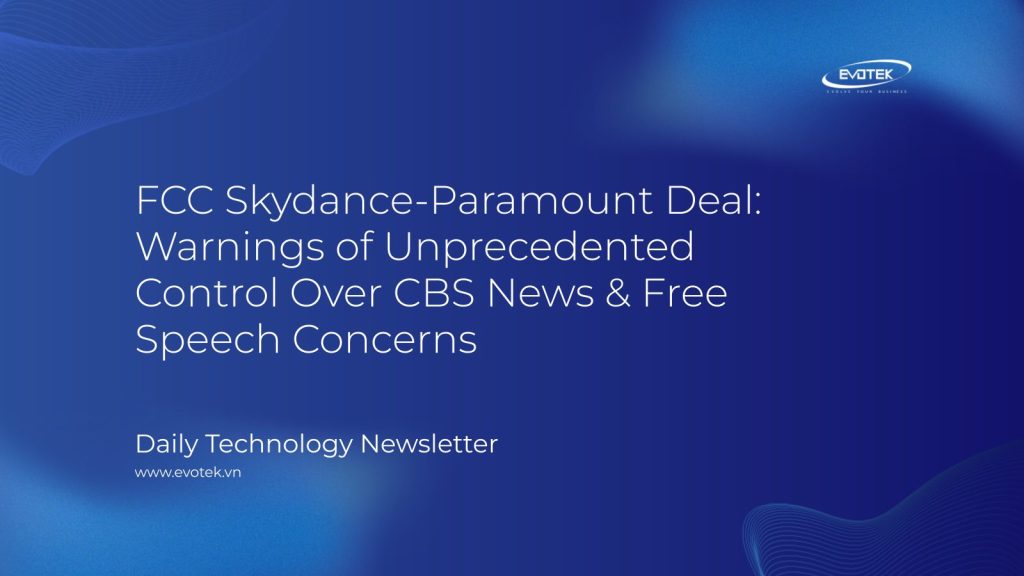The Federal Communications Commission (FCC) has given its approval to Skydance’s significant $8 billion acquisition of Paramount, the media giant owning CBS. However, this high-stakes decision is sparking intense controversy, with one commissioner alleging the deal grants the government unprecedented influence over a major news organization, raising grave concerns about press freedom and First Amendment protections.
Commissioner Anna Gomez, the sole Democratic voice on the FCC, vehemently dissented from the approval. Gomez asserts that the agency has imposed “never-before-seen controls over newsroom decisions and editorial judgment,” directly violating the First Amendment and established law. Her alarm stems from specific written commitments reportedly required from Skydance, which she claims allow governmental sway over CBS’s editorial direction.
FCC Chairman Brendan Carr defended the requirements, stating that Skydance has committed to ensuring all programming from the newly formed company will feature “a diversity of viewpoints from across the political and ideological spectrum.” Carr contended that these conditions are vital to rebuilding Americans’ trust in mainstream media, echoing conservative critiques of perceived media bias, particularly against former President Donald Trump. The agreement also mandates the appointment of an ombudsman for two years to guarantee CBS’s reporting remains “fair, unbiased, and fact-based,” with any complaints of bias to be reviewed by the president of New Paramount.
Gomez, however, condemned these requirements as a “cowardly capitulation” to the Trump administration, warning that the public will “pay the price.” She accused the FCC of misusing its “vast power to pressure Paramount to broker a private legal settlement” and further eroding journalistic independence. Gomez explicitly labeled the requirements as part of the Trump administration’s “coordinated campaign to censor speech, control narratives, and silence dissent.”
This controversy unfolds against a backdrop of past disputes. Early in his presidency, Donald Trump engaged in public feuds with news networks, including CBS, prompting FCC Chairman Carr to revive previously dismissed complaints alleging broadcast station bias. More recently, Paramount agreed to a $16 million settlement stemming from Trump’s claims that CBS’s 60 Minutes deceptively edited a pre-election interview with Kamala Harris. Senator Elizabeth Warren (D-Mass.) even suggested this settlement might have been a “bribe” to expedite the Skydance deal.
The situation gained further public attention when comedian Stephen Colbert, whose highly-rated CBS Late Show is reportedly facing cancellation next May (a move many see as censorship due to his satirical jabs at Trump), pointedly mocked the settlement on air. Colbert, jesting about “cancel culture,” hinted at the financial implications for Paramount and questioned where the $16 million could have been spent, drawing a direct link to the settlement.
Adding to concerns about political influence on media, the White House issued a rare statement responding to a recent South Park episode (aired by Paramount) that mockingly depicted Trump. While the statement dismissed the show, critics viewed it as further evidence of Trump’s sustained focus on media portrayal and a potential desire to impact negative coverage.
Commissioner Gomez explicitly warned that the “Paramount payout” combined with the “reckless” acquisition approval marks a “dark chapter” for press freedom in the U.S. She expressed concern that this decision would embolden those who believe the government can “abuse its power to extract financial and ideological concessions, demand favored treatment, and secure positive media coverage.”
Another point of contention in the FCC’s terms relates to Skydance’s hiring practices. Gomez criticized the FCC for overstepping its authority by requiring commitments against establishing Diversity, Equity, and Inclusion (DEI) programs, which Chairman Carr had derided as “invidious.” Gomez argued that by meddling in private companies’ employment decisions, the agency is “undermining legitimate efforts to combat discrimination and expand opportunity.”
Despite Gomez’s strong objections, Commissioners Olivia Trusty joined Carr in voting to approve the deal, celebrating it as “lawful” and a “win” for American “jobs” and “storytelling.” Carr suggested the approval would infuse $1.5 billion into Paramount’s operations, helping it “compete with dominant tech platforms.”
Although outvoted 2-1, Gomez expressed satisfaction that her request for a public vote was granted, preventing the outcome from being “buried” in secretive negotiations. She concluded by urging “companies, journalists, and citizens” to actively push back against the Trump administration, emphasizing that “unchecked and unquestioned power has no rightful place in America.”

 日本語
日本語 한국어
한국어 Tiếng Việt
Tiếng Việt 简体中文
简体中文